| Listing 1 - 10 of 71 | << page >> |
Sort by
|
Book
ISBN: 3428508726 3428108728 342880872X Year: 2002 Publisher: Berlin, [Germany] : Duncker & Humblot,
Abstract | Keywords | Export | Availability | Bookmark
 Loading...
Loading...Choose an application
- Reference Manager
- EndNote
- RefWorks (Direct export to RefWorks)
Mill, John Stuart, --- 穆勒
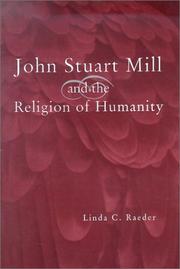
ISBN: 0826263275 9780826263278 9780826213877 0826213871 0826213871 Year: 2002 Publisher: Columbia, Mo. University of Missouri Press
Abstract | Keywords | Export | Availability | Bookmark
 Loading...
Loading...Choose an application
- Reference Manager
- EndNote
- RefWorks (Direct export to RefWorks)
Mill, John Stuart, --- 穆勒 --- Religion.
Book
ISBN: 9781847062406 9781847062390 Year: 2010 Publisher: London Continuum
Abstract | Keywords | Export | Availability | Bookmark
 Loading...
Loading...Choose an application
- Reference Manager
- EndNote
- RefWorks (Direct export to RefWorks)
Mill, John Stuart --- Mill, John Stuart, --- 穆勒
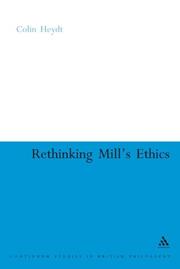
ISBN: 0826486398 Year: 2006 Publisher: London ; New York Continuum
Abstract | Keywords | Export | Availability | Bookmark
 Loading...
Loading...Choose an application
- Reference Manager
- EndNote
- RefWorks (Direct export to RefWorks)
Aesthetics, Modern --- Ethics, Modern --- Aesthetics --- History --- Mill, John Stuart, --- 穆勒
Book
ISBN: 1108620957 1108755992 1108485294 1108618065 Year: 2020 Publisher: Cambridge : Cambridge University Press,
Abstract | Keywords | Export | Availability | Bookmark
 Loading...
Loading...Choose an application
- Reference Manager
- EndNote
- RefWorks (Direct export to RefWorks)
John Stuart Mill is the father of modern liberalism. His most remembered work, On Liberty, which was published in 1859, changed the course of the liberal tradition. What is less well-known is that his ideas have profoundly influenced the American constitutional rights tradition of the latter half of the twentieth century. Mill's 'harm principle' inspired the constitutional right to privacy recognized in Griswold v Connecticut, Roe vs Wade and other cases. His defense of freedom of expression influenced Justices Holmes, Brandeis, Douglas, Brennan and others and led to greatly expanded freedom of speech in the twentieth century. Finally, Mill was an ardent feminist whose last important work, The Subjection of Women, was a full-scale and, for its time, radical defense of complete gender equality. This is a book for lawyers who want to understand the intellectual origins of modern constitutional rights, and for political philosophers interested in the constitutional implications of Mill's conception of freedom.
Civil rights --- Philosophy. --- Mill, John Stuart, --- 穆勒 --- Influence.
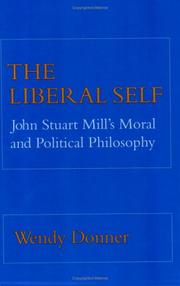
ISBN: 0801426294 9780801426292 Year: 1991 Publisher: Ithaca (N.Y.) Cornell university press
Abstract | Keywords | Export | Availability | Bookmark
 Loading...
Loading...Choose an application
- Reference Manager
- EndNote
- RefWorks (Direct export to RefWorks)
Ethics, Modern --- Political science --- Philosophy --- History --- Mill, John Stuart, --- 穆勒
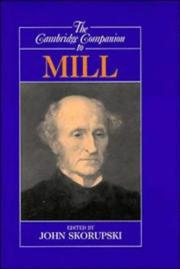
ISBN: 0521419875 0521422116 Year: 1998 Volume: *17 Publisher: Cambridge Cambridge University Press
Abstract | Keywords | Export | Availability | Bookmark
 Loading...
Loading...Choose an application
- Reference Manager
- EndNote
- RefWorks (Direct export to RefWorks)
Mill, John Stuart --- Philosophy, English --- Philosophie anglaise --- Mill, John Stuart, --- 穆勒
Book
ISBN: 9780521761086 9781139028011 9781107248106 1107248108 9781107249769 1107249767 1139028014 9781107247277 1107247276 0521761085 1139887904 9781139887908 1107240840 9781107240841 1316648613 9781316648612 1107250595 9781107250598 1107248930 9781107248939 1299707378 Year: 2013 Publisher: Cambridge Cambridge University Press
Abstract | Keywords | Export | Availability | Bookmark
 Loading...
Loading...Choose an application
- Reference Manager
- EndNote
- RefWorks (Direct export to RefWorks)
Many discussions of J. S. Mill's concept of liberty focus too narrowly on On Liberty and fail to acknowledge that his treatment of related issues elsewhere may modify its leading doctrines. Mill and Paternalism demonstrates how a contextual reading suggests that in Principles of Political Economy, and also his writings on Ireland, India and on domestic issues like land reform, Mill proposed a substantially more interventionist account of the state than On Liberty seems to imply. This helps to explain Mill's sympathies for socialism after 1848, as well as his Malthusianism and feminism, which, in conjunction with Harriet Taylor's views, are central to his later discussions of the family and marriage. Feminism, indeed, is shown to provide the answer to the problem which most agitated Mill, overpopulation. Thus Gregory Claeys sheds new lights on many of Mill's overarching preoccupations, including the theory of liberty at the heart of On Liberty.
Paternalism. --- Parentalism --- Social classes --- Social control --- Social systems --- Mill, John Stuart, --- 穆勒 --- Arts and Humanities --- History
Book
ISBN: 0520048679 Year: 1984 Publisher: Berkeley, Calif. University of California Press
Abstract | Keywords | Export | Availability | Bookmark
 Loading...
Loading...Choose an application
- Reference Manager
- EndNote
- RefWorks (Direct export to RefWorks)
Ethics, Modern --- Political science --- History --- Mill, John Stuart, --- 穆勒 --- General ethics --- Mill, John Stuart
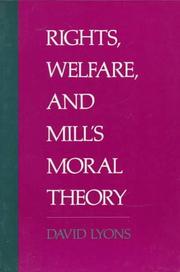
ISBN: 1280526777 0195359631 1429405716 9781429405713 9781280526770 9780195082173 0195082176 0195082184 9780195082180 0195082176 0197731570 Year: 1994 Publisher: New York (N.Y.): Oxford university press
Abstract | Keywords | Export | Availability | Bookmark
 Loading...
Loading...Choose an application
- Reference Manager
- EndNote
- RefWorks (Direct export to RefWorks)
This volume collects David Lyons's essays on Mill's moral theory and includes an introduction which relates the essays to prior and subsequent philosophical developments. The essays defend the beneficiary theory of rights and develop new interpretations of Mill's moral thought.
Ethics, Modern --- Utilitarianism. --- Ethics --- Hedonism --- Philosophy --- Mill, John Stuart, --- 穆勒 --- Utilitarianism
| Listing 1 - 10 of 71 | << page >> |
Sort by
|

 Search
Search Feedback
Feedback About UniCat
About UniCat  Help
Help News
News